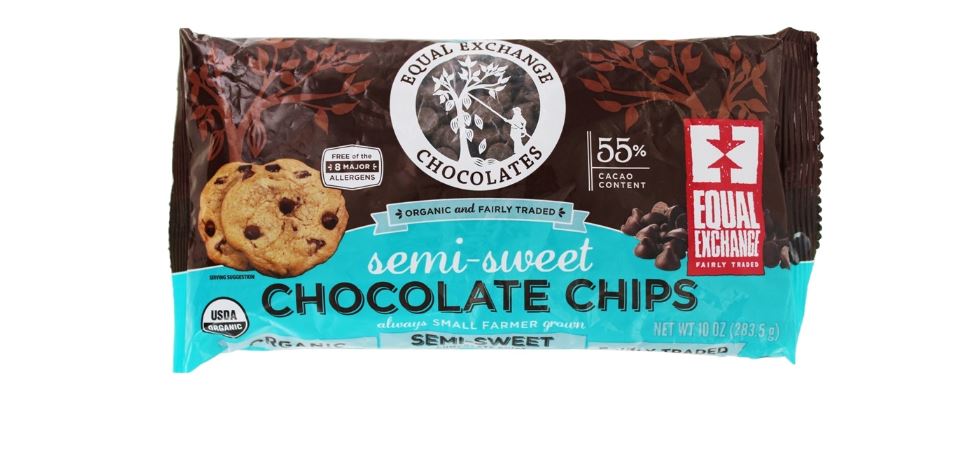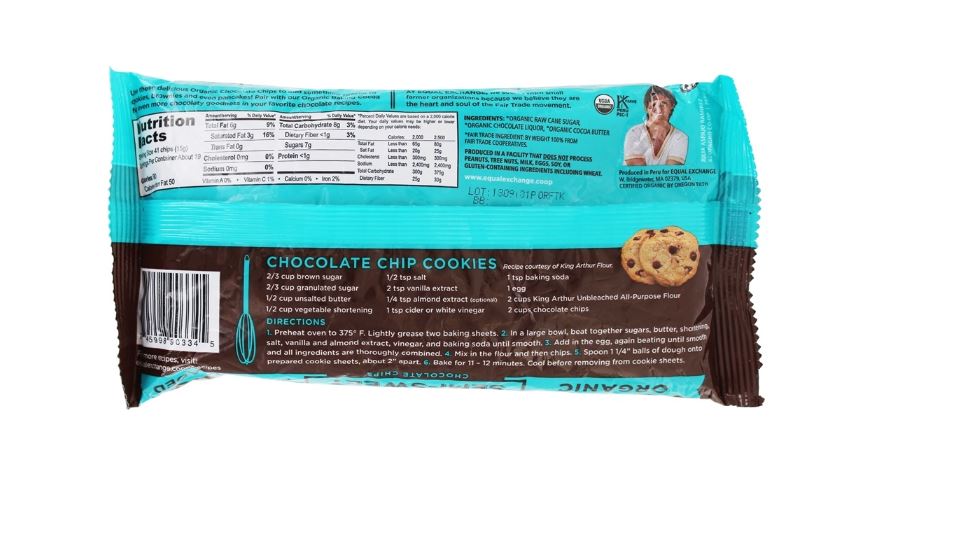Organic & Fairly Traded Chocolate Chips Semi-Sweet 55% Cacao - 10 oz. Equal Exchange
Leave a review Ask a question #191076Overview
Description
Equal Exchange - Organic & Fairly Traded Chocolate Chips Semi-Sweet - 10 oz. (283.5 g)
Use these delicious Organic Chocolate Chips to add something special to cookies, brownies and even pancakes! Pair with their Organic Baking Cocoa for even more chocolaty goodness in your favorite chocolate recipes.
- USDA Organic
- Worker-Owned Cooperative
- Kosher
- Vegan, and soy-free
-
Story
Made with organic and fairly traded cacao from small-scale farmers in Peru, and sugar from small-scale farmers in Paraguay.
Equal Exchange Mission
Equal Exchange's mission is to build long-term trade partnerships that are economically just and environmentally sound, to foster mutually beneficial relationships between farmers and consumers and to demonstrate, through their success, the contribution of worker co-operatives and Fair Trade to a more equitable, democratic and sustainable world.
About Equal Exchange
Equal Exchange is a worker–owned cooperative that has been leading the authentic Fair Trade movement and creating big change since 1986. They believe in a fair and honest trade system that empowers both farmers and consumers, and with your help, they're creating a more equitable, democratic, and sustainable world.
To help realize this vision, Equal Exchange have built long-term, mutually beneficial trade partnerships with small farmer cooperatives around the world. These relationships mean better prices for their producers, higher quality products for you, and a stronger global community. They've committed to the environment, too, by implementing sustainable, organic agriculture practices to protect its valuable resources.
And that's just the beginning! Together, Equal Exchange is changing the way trade happens around the world. With Equal Exchange, you can feel good knowing that every single one of your purchases directly benefits and strengthens the hardworking people and communities that make your favorite products possible.
They believe in building strong communities and connecting them through a shared love of not only great coffee, but a love for all that is fair, cooperative, and just.
Equal Exchange Model
At Equal Exchange they believe that they should expect no less from themselves and each other than they demand of their farmer partners. For that reason they have organized themselves as a democratic worker cooperative, now one of the largest in the country. A worker cooperative is an alternative for-profit structure based upon standard democratic principles. It is not designed to maximize profits, nor returns to investors, but rather to bring to the workplace many of the rights and responsibilities that we hold as citizens in our communities.
Fair Trade
Fair Trade is for small farmers and small producers who are democratically organized. If you take the democracy out you have traditional aid or world bank development or what the TransFair USA and the European certifiers are now trying to call Fair Trade...If you want the fastest supply chain that produces the most tea or coffee or bananas at commercial terms you have entered into some socially responsible product world of which there are many examples. It just ain’t Fair Trade, and it won’t have the same positive benefits.
Equal Exchange Model: Authentic Fair Trade
In 1986, Equal Exchange was founded to challenge the existing trade model, which favors large plantations, agri-business, and multi-national corporations; support small farmers; and connect consumers and producers through information, education, and the exchange of products in the marketplace. With our founding, we joined a growing movement of small farmers, alternative traders (ATOs), religious organizations, and non-profits throughout the world with like-minded principles and objectives. Underlying our work is the belief that only through organization, can small farmers survive and thrive. The cooperative model has been essential for building this model of change.
Standards and Practices
Fair Trade is a way of doing business that ultimately aims to keep small farmers an active part of the world marketplace, and aims to empower consumers to make purchases that support their values. Fair Trade is a set of business practices voluntarily adopted by the producers and buyers of agricultural commodities and hand-made crafts that are designed to advance many economic, social and environmental goals, including:
- Raising and stabilizing the incomes of small-scale farmers, farm workers, and artisans
- More equitably distributing the economic gains, opportunities and risks associated with the production and sale of these goods
- Increasing the organizational and commercial capacities of producer groups
- Supporting democratically owned and controlled producer organizations
- Promoting labor rights and the right of workers to organize
- Promoting safe and sustainable farming methods and working conditions
- Connecting consumers and producers
- Increasing consumer awareness and engagement with issues affecting producers
The Fair Trade practices that advance these goals typically, but not always, include:
- Direct trade relationships and long term contracts between importers and producer groups
- Sourcing from small-farmer or artisan co-operatives
- Higher than conventional market prices, either through above-market premiums and/or price floors
- The provision of affordable credit
- Adherence to the policies of the International Labor Organization, especially those concerning child and forced labor and the right to collective bargaining
- The prohibition of the use of the more dangerous pesticides and herbicides
- Substantial price premiums for the production of certified organic crops
- External monitoring, auditing, and certification of these practices by independent third-parties
History of Fair Trade
Fair Trade started with individual companies called Alternative Trade Organizations (ATOs), who made a commitment to work directly with indigenous peoples and to market their products directly to consumers. By cutting out middlemen, ATOs have been able to pay farmers substantially more while offering a competitive product.
Later, organizations like the World Fair Trade Organization were formed to communicate ideas about Fair Trade. With the introduction of Fair Trade certification organizations like TransFair USA, products from around the world started to be certified as fairly traded. In an endeavor to place a world standard on what is fair, these labeling organizations came together and formed the Fairtrade Labeling Organization (FLO).
How Fair Trade Benefits Small Farmers
Fair Trade is not a charity or handout; it is simply a process of giving a fair exchange. Equal Exchange provides high-quality foods at a fair price to you. By cutting out the middlemen, Equal Exchange pays the farmers more and gives you a better value.
Suggested Use
Use these delicious Organic Chocolate Chips to add something special to cookies, brownies and even pancakes!
Ingredients
| Equal Exchange - Organic & Fairly Traded Chocolate Chips | ||
| Semi-Sweet 55% Cacao - 10 oz. (283.5 g) | ||
| Other Ingredients: *Organic raw cane sugar, *Organic chocolate liquor, *Organic cocoa butter. *Fair Trade ingredient: by weight 100% from Fair Trade cooperatives. | ||
Warnings
Questions & Answers
2 Reviews
Needless to say, after a week or so I quit using. They need to be smoother and actually have the ability to dissolve.



















It works!
Recommended by a friend
trying a new brand of zinc lozenge
Good for colds etc..